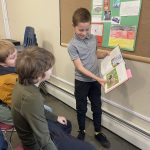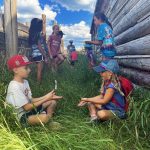What does it mean to be a 'growth' minded school?
Mountain Connection, September 26, 2022
By: Jed Donnel
When I was in high school, the question as to whether or not I was ever doing well in a course was easily determined by figures. If I had an ‘A’, I was told – whether overtly or indirectly – to keep doing whatever I was doing to prepare for tests (the typical measurement of comprehension to which I was subjected, regardless of discipline), whereas if I had something less than an A, I should either increase the amount I was studying or, more ominously, accept that a specific academic discipline was just not for me. School was mostly a whittling down of my interests, which was often weirdly described to me as ‘discovery’ (of my own abilities, or passion, or some such euphemism) but really was a process of elimination. Despite my actual interests in how all things worked, mathematics were more difficult for me to immediately grasp than, say, composition in art or literature. So, while I was told from a young age that I was a ‘creative’ and ‘abstract’ thinker, I was also slowly but definitely dissuaded from math and sciences. My older brother went in exactly the opposite direction, away from the humanities and towards numerical reasoning that came more naturally to him. It turns out, however, that he and I are far more alike than different, both interested, still, in how the world works in its complexities. However – at least as a partial consequence of what we were told of ourselves as kids – he has not read anywhere near the volume of fiction that I have, while I do not recall the math that he takes for granted on a daily basis. Likewise, although I’m now interested in the concepts of theoretical physics, math sounds to me like a distant, foreign language, and though he is philosophically minded, he has not read the philosophers who helped coin such ideas. We are the products of schooling that, today, would best be described as ‘fixed’, and although we are both well-educated within that system, its effects still linger with us.
As a teacher, I tend to look for methods and applications that do not fit my past. True, there are certain past teachers who have influenced my style, although usually I find myself consciously trying not to emulate my former teachers, especially if they assumed who I was rather than helping me to figure out what I could be. Moreover, the teachers I’ve had who most positively impacted my thinking today did not accept what I once thought of myself when I took their class. Even if I had an A – and especially if I didn’t – my best teachers always assumed that I could improve, and that interesting answers to any problem required invention, failure, experiment, and revision. They were, I realize now, ‘growth minded’ rather than fixed, and they were inspirational because they always wanted more from me, thought that I could do it, and were always willing to help me to discover what I didn’t already know.
Today, education sounds quite different than when I was a student, and sometimes it really is. For example, the terms ‘fixed’ and ‘growth’ have become relatively commonplace among teachers around the country. Sometimes, too, they are well-used and well understood, which results in vastly different and better results than what I experienced as a high school student. At SMS, the entire faculty is undergoing the process of complex introspection in considering such terms as ‘fixed’ and ‘growth’ as they apply to our own teaching practices. And, importantly, we’re trying not to take anything for granted. To use such terms well, we need to go deep and be honest, to critically think about the type of language we use with our students and the ways that we influence how they conceive of themselves as learners. As Samatha puts it, “Teachers’ beliefs about intelligence and their students’ capacities to learn form the basis of their pedagogy. When a student isn’t learning, a good teacher will ask themself, ‘How might I approach this differently or shift the learning conditions to end up with quality results?’ Excellent teaching starts with the understanding that all students can develop their intelligence through effective effort.” Of course, if asked, we would all describe ourselves as ‘growth.’ But, to really know, we need to first devote time and attention to self-assessment. Last week, during our staff meeting, we followed an overview of such concepts with a few online assessments, each a series of questions that, when answered honestly, place each teacher on the spectrum between ‘growth’ and ‘fixed’; the data is unique per person and accompanied by descriptions to help clarify the context of each, along with suggestions for how such perspectives may manifest in the classroom. It begins the conversation for how we really think and speak; the larger process of redefining and reapplying a ‘growth’ mindset in the classroom will be ongoing.
Author and Stanford professor of psychology Carol Dweck, who is among the researchers responsible for the terms “growth” and “fixed,” continues to explore the practices of both mentalities in education. In an article for Education Week, which the SMS staff is reading in preparation for our meeting this coming Wednesday, she states, “[What keeps me up at night is] the fear that the mindset concepts, which grew up to counter the failed self-esteem movement, will be used to perpetuate that movement.” Dweck notes that the terms are too often used in the classroom these days as reductive; ‘growth’ too easily describes students who work hard (even if they don’t work well), while ‘fixed’ too often qualifies as an ironic criticism for any student who doesn’t perform to expectations, a la ‘Well, they just have a fixed mindset, so they’re not letting themselves improve.’ Dweck, therefore, challenges educators to reinvest in the purposes of the terms, to think about their complex applications, and to devote ourselves to always finding ways of helping students to learn, rather than justifying what they can and cannot do. She posits that the best practices occur in the details and that we should not assume simplicity in describing complex processes, whether neurological or social. She states, “Let’s acknowledge that (1) we’re all a mixture of fixed and growth mindsets, (2) we will probably always be, and (3) if we want to move closer to a growth mindset in our thoughts and practices, we need to stay in touch with our fixed-mindset thoughts and deeds.” In other words, teachers need to be aware of our own tendencies and our own language as we work with students to recognize their own tendencies and to alter (or reinforce) the terms they use to describe themselves. If we’re too quick to abandon any and all notion of ourselves or our school culture as at all ‘fixed’, we’ll at least dilute the premise of what it means to be ‘growth’ minded, since we will cease to acknowledge our own flaws. Or, perhaps more to the point, we’ll become fixed in calling ourselves ‘growth’, which renders the term and its complicated purposes ironically meaningless. Dweck sees such tendencies happening too often in schools, which adopt the terms but not the methods, even when they have the best of intentions.
SMS is certainly a growth-minded school, and the faculty as a whole readily appreciates how and why we assist students in various modes of exploration. For that same reason, we’re now turning our attention to the day-to-day, the ways in which our core principles are – and can further be – reflected in our nuanced actions and interactions. To help facilitate our intentions and refine our practices, therefore, we cannot take for granted the ways in which we communicate with our students. Likewise, we need to assist them in looking beyond their impressions of themselves within categories and encourage them as the true meaning of lifelong learners. In the best of ways, therefore, our students are never finished in that process, nor are we.



